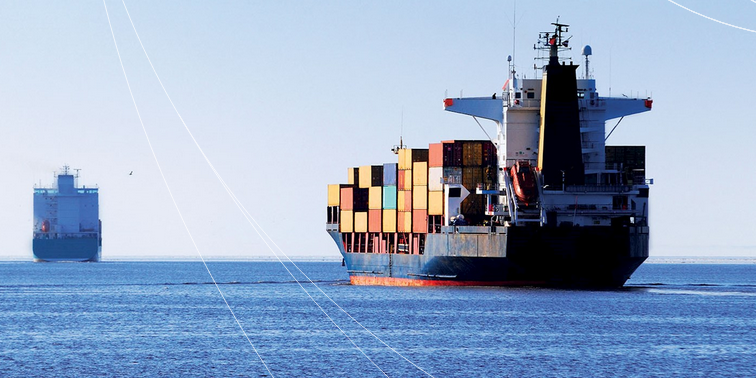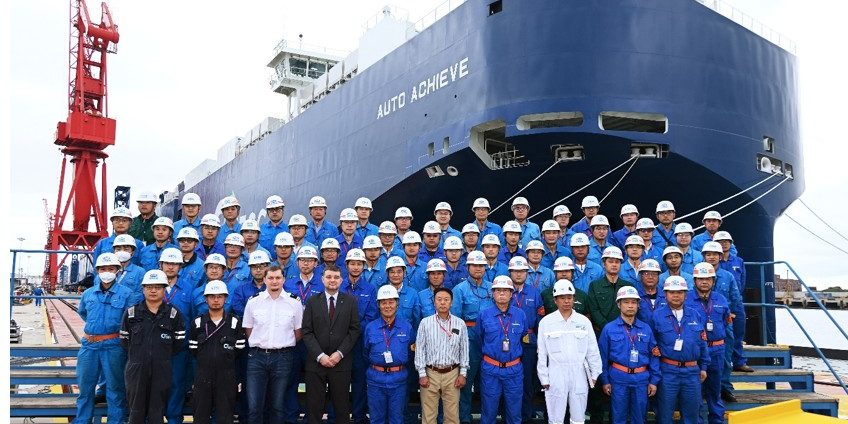UECC has further strengthened its sustainable fleet of pure car and truck carriers (PCTCs) with the landmark delivery of a second multi-fuel LNG battery hybrid newbuild from China’s Jiangnan Shipyard. The latest PCTC, to be named Auto Achieve, will further contribute to reduced emissions for the environmentally focused ro-ro carrier in the European shortsea trade where it will join sister vessel Auto Advance that was delivered from the Chinese yard late last year.
“UECC has taken a progressive approach to curbing its environmental footprint with these newbuilds that are the first PCTCs to adopt this innovative technological solution, which is based on stringent design criteria for energy efficiency,” said Glenn Edvardsen, CEO of UECC.
The company will have a total of five eco-friendly vessels – over 50% of its owned fleet of nine PCTCs – when the third and final newbuild in the series is delivered later this year. The three new multi-fuel LNG battery hybrid vessels will also meet the IMO Tier 3 NOx emissions limitations entering into force in the Baltic Sea and North Sea from 2021 keel lays. UECC earlier developed the pioneering dual-fuel LNG vessels Auto Eco and Auto Energy that have been meeting the IMO carbon-intensity target during six years of operation.
“No other shortsea or deepsea operator can demonstrate such a sustainable fleet. UECC has been a first-mover for green operations in the car carrier segment and is now benefiting from this proactive strategy by realizing significant fuel efficiency gains and emission reductions,” Edvardsen commented.
The unique solution combining multi-fuel LNG engines for main propulsion and auxiliaries together with battery hybrid capability was developed by UECC together with DNV and Jiangnan’s in-house ship designer Shanghai Merchant Ship Design & Research Institute. Multi-fuel engines enable a CO2 emissions reduction of around 25%, SOx and particulate matter by 90% and NOx by 85% from the use of LNG and are also adaptable for low-carbon fuels such as bio-LNG and synthetic fuels as these become available.
The addition of hybrid technology marks another step up in sustainability as battery power can further reduce emissions through peak shaving, in addition to handling partial accommodation load and driving auxiliary equipment, while boosting operating efficiency. The use of battery power is also beneficial for port calls as it eliminates particulate matter and other harmful emissions that represent a public health risk in coastal cities.
With the expected advent of the EU’s Emissions Trading System for shipping in 2024, UECC’s green fleet will prove a competitive advantage as more pollutive vessels will face higher costs in calling at European ports.
“Our investment in these newbuilds was based on our ethical belief in the need for decarbonization of shipping to make a difference for the environment, given the industry’s high level of emissions relative to other sectors,” Edvardsen added. “UECC’s decision has since been vindicated as increasing regulatory and market pressure for green operations have demonstrated the value of this future-oriented investment.”

WinGD shares decarbonization strategy, includes LNG & bioLNG technologies
Swiss marine power company WinGD has published a new white paper highlighting its holistic approach to help ship owners and operators to decarbonize their vessels. The paper, titled The X-Act Initiative, outlines WinGD’s development programs in five areas – advanced engine technologies, core engine development, green technologies, digitalization and integration, and the autonomous engine room. Projects include the latest generation of dual fuel engine technologies, novel on-engine emission abatement systems, alternative fuel developments and advances in hybrid energy system integration and control software.
“To decarbonize shipping at the pace that society demands, we must act immediately and across several areas. A coordinated approach across these efforts maximizes the possibility that WinGD’s ecosystem of solutions will deliver the breakthroughs that shipping needs,” said Dominik Schneiter, Vice President Research & Development, WinGD.
WinGD provides opportunities for rapid decarbonization and wider emission reduction across its engine portfolio, most notably through the dual fuel X-DF range. These widely deployed engines are already capable of using carbon-neutral fuels including synthetic and bio-LNG, while the latest X-DF2.0 technologies further improve both methane slip and overall greenhouse gas (GHG) emissions performance.
The answer to maritime decarbonization includes far more than engines and fuels, and so does WinGD’s solutions ecosystem. The company has also invested in developing expertise in hybrid power arrangement design and integration. Its first system integration contract is underway for four newbuild car carriers – featuring WinGD’s X-DF dual fuel LNG engines and batteries – being built for NYK Line.
The development of digital optimization solutions, as well as the training and ongoing support needed to use all systems to best effect, completes WinGD’s holistic approach to improving energy efficiency and ultimately reducing carbon reliance across ship owners’ fleets. By closely coordinating across these development projects, WinGD aims to maximize the benefit of combining multiple emission reduction measures, helping to minimize shipping’s GHG impact in line with regulatory targets and societal expectations.







